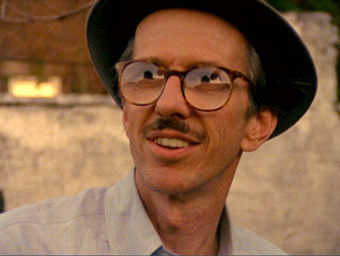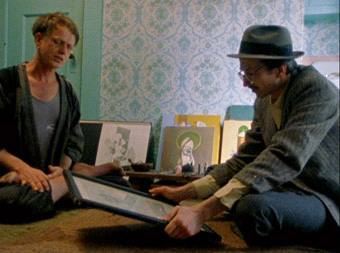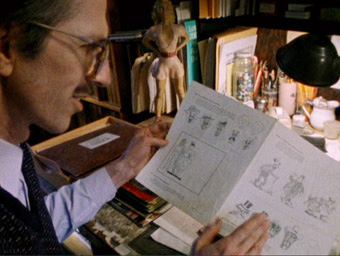|
Few
could question the fact that Robert Crumb is a very talented
man. As someone who went to art school and flirted with
cartooning but gave it up early for film, I am always impressed
when I watch someone who can really draw practicing their art. For some reason I've always been particularly
amazed by pen and ink drawings, where you have only one
colour to work with and shading has to be created by lines
and cross-hatching rather than varying shades of grey or
colour, and whose every stroke is a permanent commitment that cannot be erased or corrected or painted over.
Many
of you will know the name of Robert Crumb, but a fair few
will probably not. His very distinctive artwork found a
perfect outlet in the underground comics of the late 1960s,
and in the years that followed he achieved a cult
fame for his very distinctive style and sometimes casually
confrontational approach to his subject matter. Crumb tended
to project his life and his fantasies into his
drawings and cartoon strips, some aspects of which not everyone
will be comfortable with. Looking through his
early sketch books at one point, ex-girlfriend Kathy Goodell
says to him "You really hated women then. You think
it's improved since?" to which Robert replies, "Yeah.
I hate them a little less now." Easy though it may
be to nod in agreement, this smacks a little of Crumb playing
up to the label some have placed on him. That he objectifies
women in his drawings is beyond question, but this is more
the result of sexual fetish than any genuine animosity.
Nonetheless, there are still plenty of works, one of which
is covered in detail in the film, that almost seem designed
to cause offence. A feminist Robert Crumb clearly is not.

If this film was a standard portrait of an artist and his
work, however controversial, it would hardly have landed
the Grand Jury Prize at Sundance and a whole slew of other
documentary awards. Admittedly Crumb himself is a fascinating
figure, a gawky misfit whose talent and fame have enabled
him to remain so and force others to accept
him as he is. His extraordinary openness about every aspect
of his life repeatedly catches you off guard, while his
weary cynicism for just about everything actually proves rather endearing – observing passers-by dressed from head to toe in logo-emblazoned
clothing, he bemoans their status as pathetic walking advertisements
and at this point in his life is in the process of moving to France because,
he claims, "it's slightly less evil than the United
States." He comes across as a man who was born out of his time
and has a particular loathing of almost all aspects of the
modern world. "When I listen to old music," he
says as he puts on a 78rpm record, "it's one of the few times
I actually have a kind of love for humanity."
All
of which is entertaining, even enthralling viewing, but
it's in the dealings with Robert's immediate family that
the film chooses to go where few others have trodden, getting sometimes
uncomfortably up close and personal with his two brothers
Maxon and Charles. Both are intelligent and articulate men,
both have considerable artistic talent of their own, and
both are clearly very screwed up. Maxon lives in a seedy motel
and observes an almost monk-like existence, one that includes
spending two hours a day in the lotus position on a bed of nails and
regularly swallowing a tapeworm-sized length of cloth to
clear out his intestines, while Charles still lives with
their mother and has not left the house for years. All three
brothers talk openly about masturbation and sexual urges,
Maxon cheerfully reminisces the times he spent molesting
women on trains, and Charles recalls his fantasies about
killing Robert with knife or axe. You can't help wondering
at times if it actually occurred to any of them that these
chats would end up projected in a cinema, watched and listened
to the very people they appear to be hiding from. But accusations of unfeeling voyeurism
are misguided. Crumb and director Terry Zwigoff were close friends for
years before the film was made and even played together
in a band. It's his affection for the Crumb family that prompts Zwigoff to get as close to them as he does, an intimate approach that enables us to engage with rather than marginalise them.

Although
their friendship would have made it easy for Zwigoff to
pay lip service to his subject, he presents all aspects of the artist's
personality with the sort of honesty that Crumb himself
regularly displays, and it's this juxtaposition of extremes
that repeatedly catches you on the hop. One minute we're
shown Crumb as the caring father, balancing his young daughter
on his knee and helping his son Jesse to develop his own
considerable artistic skills, another he's taking part in
a photo shoot with half-naked women in the manner of a cartoon
dirty old man. We watch in admiration at his detailed drawings
of street scenes and cafe customers, then shift uncomfortably
as he cheerfully takes us through a misogynistic cartoon
strip about a man who is given a headless woman to use for
sexual pleasure.
You
are left with the sense that had Robert Crumb not found
an outlet for his own internal demons, however benevolent
they may be, he too may have ended up like his brothers,
locked in a room and controlling his psychosis with medication.
But find an outlet he did and the sheer volume of work
he has produced is astonishing in itself, especially given
the twisted imagination and complexity of many of the drawings.
You may not like them, you may not even like the artist,
but in getting so close to Crumb and
his family and associates, Zwigoff's remarkable film ensures that whatever judgement
you make, it won't be for lack of information or understanding.
Just
before the main feature starts, a white-on-black caption
appears and tells you the following:
This
film has been modified from its original version.
It
has been formatted to fit this screen.
This
screen. Well in my case the aspect ratio of "this screen"
is 16:9, and the 1.37:1 print here certainly does not fit it.
I'll admit that I've only seen the film in this aspect ratio,
but I've only seen it on TV and DVD, and this caption is
effectively informing me that this is not the original aspect
ratio. (The IMDB lists the aspect ratio as 1.37:1, but I
long ago learned to distrust their technical information.)
Certainly there are moments throughout the film where the
framing feels uncomfortably tight on the sides, and the
end credits are framed approximately 1.85:1. Hmm. Given
that this is a re-issue that is designed to improve on previous
releases, this is a little disappointing.

In
other ways the picture quality is pretty good, given that
this was shot on high grain stock in sometimes less than
ideal lighting conditions (whether it was shot on 16mm or
35mm I have yet to confirm). Detail is generally good and
the colour, when the light is right, is excellent. The contrast is solid, though on the strong side at times – certainly it is higher than on the existing region 2 Optimum
disc (an NTSC to PAL transfer that this disc definitely
improves on), but the picture is also slightly darker, and
I had to crank up my brightness control to see shadow detail
in some scenes. Grain is very visible throughout.
The
Dolby 2.0 stereo soundtrack copes well with the acoustic
issues of some of the locations, and on the whole is fine.
'The old music' is well enough reproduced.
Announced
originally as a "special edition' – although there
is nothing on the box to suggest this status – there is
only one extra of note, but it is a goodie. The Commentary
Track with director Terry Zwigoff and critic
Roger Ebert provides a great deal of background information
on the making of the film, on the director's relationship
with his subject, and on the various participants, especially
Crumb himself. It's a very interesting and informative track,
and Ebert feeds Zwigoff well – the director freely admits
that were he on his own he would probably have just sat
and watched the film.
One
other extra is included in the shape of a Sneak
Peek of Art School Confidential (2:08), which
consists of a short extract from Zwigoff's latest film,
chosen at what appears to be random and giving little away – if you really want an advance look, check out the trailer
on-line.
There
are also Trailers for ten other
Sony releases. If trailers are your thing, this should keep
you busy for a while.
One
of my favourite documentaries still doesn't quite get the
handling it deserves. The transfer is good but still feels
cropped at times, and surely there could have been more
extra material included here – the disc cries out for the
BBC TV documentary on Crumb that was shot at the same time
as Zwigoff's film and is discussed more than once on the
commentary track. In the end it is this very commentary
that makes the DVD a still worthwhile purchase for fans
who already have an earlier release. If you don't then this
is definitely the one to go for.
|